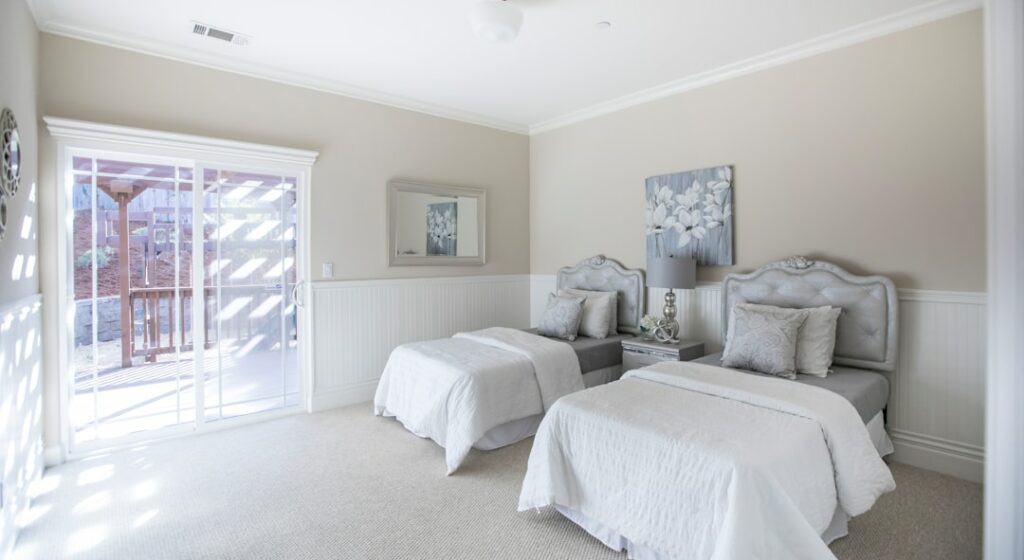Sleep is a vital component of overall health and well-being. It is during sleep that our bodies repair and rejuvenate, allowing us to wake up feeling refreshed and ready to take on the day. However, the quality of our sleep is heavily influenced by our sleep environment. Creating a sleep environment that promotes relaxation and comfort is essential for getting a good night’s sleep.
The role of the sleep environment in promoting quality sleep cannot be overstated. A comfortable and inviting sleep environment can help to reduce stress and anxiety, allowing us to fall asleep faster and stay asleep longer. On the other hand, a sleep environment that is uncomfortable or disruptive can lead to restless nights and poor sleep quality.
Key Takeaways
- A good sleep environment is crucial for quality sleep and overall health.
- Choosing the right mattress and bedding can greatly improve comfort and support.
- Finding the ideal temperature and creating a dark, quiet space can enhance sleep quality.
- Minimizing noise disturbances and limiting electronic device use can also improve sleep.
- Incorporating aromatherapy, feng shui, and establishing a nighttime routine can promote relaxation and better sleep.
Choosing the Right Mattress and Bedding for Optimal Comfort
One of the most important factors in creating a sleep environment that promotes quality sleep is choosing the right mattress and bedding. The mattress you choose should provide adequate support for your body, ensuring that your spine is properly aligned while you sleep. Additionally, the mattress should be comfortable and provide pressure relief, allowing you to relax and fall asleep more easily.
When selecting bedding, it is important to consider factors such as material, thread count, and breathability. The material should be soft and comfortable against your skin, while also being breathable to prevent overheating during the night. A higher thread count can also contribute to a more luxurious and comfortable feel.
Temperature Control: Finding the Ideal Temperature for Sleep
The temperature of your sleep environment can have a significant impact on the quality of your sleep. Research has shown that cooler temperatures are generally more conducive to sleep, as they help to lower your core body temperature and signal to your body that it is time to rest.
To regulate the temperature in your sleep environment, consider using a fan or air conditioner to cool the room down before bedtime. You can also use breathable bedding materials, such as cotton or bamboo, to help wick away moisture and keep you cool throughout the night. Additionally, consider using a weighted blanket or a cooling mattress topper to help regulate your body temperature while you sleep.
Lighting: How to Create a Dark and Quiet Sleep Space
Creating a dark and quiet sleep space is essential for promoting quality sleep. Darkness helps to signal to your body that it is time to sleep, while light can interfere with your body’s natural sleep-wake cycle. Additionally, noise disturbances can disrupt your sleep and prevent you from reaching deep, restorative sleep stages.
To create a dark sleep space, consider using blackout curtains or blinds to block out any external light sources. You can also use an eye mask to further block out any light that may be seeping into your room. Additionally, consider using a white noise machine or earplugs to help drown out any noise disturbances that may be preventing you from getting a good night’s sleep.
Noise Reduction: Tips for Minimizing Noise Disturbances
Noise disturbances can have a significant impact on the quality of your sleep. Loud noises can disrupt your sleep and prevent you from reaching deep, restorative sleep stages. To minimize noise disturbances in your sleep environment, consider using soundproofing materials such as acoustic panels or soundproof curtains. You can also use a white noise machine or a fan to create a soothing background noise that can help drown out any external noises.
Electronic Devices: The Impact of Technology on Sleep Quality

The use of electronic devices before bed can have a negative impact on the quality of your sleep. The blue light emitted by electronic devices such as smartphones, tablets, and computers can interfere with your body’s natural sleep-wake cycle, making it harder for you to fall asleep and stay asleep.
To minimize the impact of technology on your sleep environment, consider implementing a digital curfew at least one hour before bed. This means turning off all electronic devices and engaging in relaxing activities such as reading or taking a warm bath. You can also use blue light-blocking glasses or install apps on your devices that filter out blue light.
Room Layout: Maximizing Space and Reducing Clutter
The layout of your sleep environment can have a significant impact on the quality of your sleep. A cluttered and disorganized space can create a sense of chaos and make it difficult for you to relax and unwind before bed. On the other hand, a clean and organized space can promote a sense of calm and tranquility, making it easier for you to fall asleep and stay asleep.
To optimize your sleep environment, consider decluttering and organizing your space. Remove any unnecessary items from your bedroom and find storage solutions for items that need to be kept in the room. Additionally, consider using calming colors and decor to create a peaceful and inviting atmosphere.
Aromatherapy: Using Scents to Promote Relaxation and Sleep
Aromatherapy is the use of essential oils and scents to promote relaxation and sleep. Certain scents, such as lavender, chamomile, and jasmine, have been shown to have a calming effect on the body and mind, making them ideal for promoting quality sleep.
To incorporate aromatherapy into your sleep environment, consider using essential oil diffusers or sprays. You can also use scented candles or sachets to infuse your sleep space with calming scents. Just be sure to choose high-quality essential oils that are safe for use in the bedroom.
Feng Shui: Applying the Principles of Energy Flow to Your Bedroom
Feng shui is an ancient Chinese practice that involves arranging furniture and objects in a way that promotes positive energy flow. When applied to the bedroom, feng shui principles can help create a sleep environment that is harmonious and conducive to quality sleep.
To apply feng shui principles to your sleep environment, consider the placement of your bed. It should be positioned in a way that allows for easy access and promotes a sense of security. Additionally, avoid placing your bed directly under a window or in line with the door, as this can disrupt the flow of energy in the room.
Creating a Nighttime Routine: Establishing Habits for Better Sleep
Establishing a nighttime routine is essential for promoting quality sleep. A consistent routine signals to your body that it is time to wind down and prepare for sleep. By following a regular routine, you can train your body to recognize when it is time to sleep and help promote better sleep quality.
To establish a healthy nighttime routine, consider engaging in relaxing activities such as reading, taking a warm bath, or practicing meditation or deep breathing exercises. Avoid stimulating activities such as watching TV or using electronic devices, as these can interfere with your body’s natural sleep-wake cycle.
In conclusion, creating a sleep environment that promotes relaxation and quality sleep is essential for overall health and well-being. By choosing the right mattress and bedding, regulating the temperature, minimizing light and noise disturbances, reducing the impact of technology, optimizing room layout, incorporating aromatherapy and feng shui principles, and establishing a nighttime routine, you can create an ideal sleep environment that will help you get the restful sleep you need.
If you’re interested in optimizing your sleep environment for better rest, you might also find this article on developing critical thinking and analytical reasoning techniques from Intelligence Snacks & Hacks intriguing. Critical thinking skills are essential for problem-solving and decision-making, which can greatly impact our overall well-being, including our sleep quality. Check out their article here to enhance your cognitive abilities and improve your sleep experience. For more insightful articles, visit their blog or explore their homepage.
FAQs
What is sleep environment?
Sleep environment refers to the physical and environmental factors that can affect the quality of your sleep, such as the temperature, lighting, noise, and comfort of your bedroom.
Why is it important to optimize your sleep environment?
Optimizing your sleep environment can help you fall asleep faster, stay asleep longer, and wake up feeling more rested and refreshed. It can also improve the overall quality of your sleep, which can have a positive impact on your physical and mental health.
What are some tips for optimizing your sleep environment?
Some tips for optimizing your sleep environment include keeping your bedroom cool and dark, minimizing noise and distractions, investing in a comfortable mattress and pillows, and using calming scents or essential oils.
How can temperature affect sleep?
Temperature can affect sleep by impacting your body’s natural sleep-wake cycle. A cooler room temperature can help you fall asleep faster and stay asleep longer, while a warmer room temperature can make it more difficult to fall asleep and stay asleep.
What role does lighting play in sleep?
Lighting can affect sleep by impacting your body’s production of melatonin, a hormone that regulates sleep. Exposure to bright light, especially blue light from electronic devices, can suppress melatonin production and make it more difficult to fall asleep.
What are some common sleep disorders that can be caused by a poor sleep environment?
Some common sleep disorders that can be caused by a poor sleep environment include insomnia, sleep apnea, restless leg syndrome, and narcolepsy. These disorders can have a negative impact on your physical and mental health, and may require medical treatment.





